01 Aug 13 | News and features, Politics and Society, Religion and Culture, United Kingdom
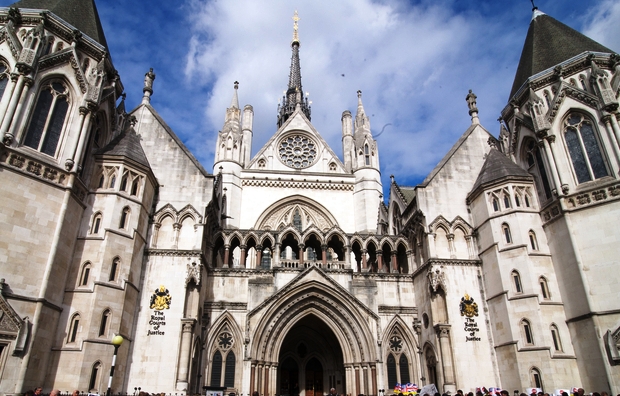
The Royal Courts of Justice, London (Image Graham Mitchell/Demotix)
A recent libel judgment has raised an interesting question: should you be able to sue for a bad review?
I should probably give a little background. This all dates back to a case involving an Amazon thread row between two men, Christopher McGrath and Vaughan Jones. In fact, I’m going to use the exact summary from last week’s judgment by Mrs Justice Davies, lest I be accused of twisting a story that’s a little complicated. Here we go (note – her punctuation, not mine):
[I]n 2010, the claimant [Christopher McGrath] published under the pseudonym “Scrooby” a book entitled “The Attempted Murder of God: Hidden Science You Really Need To Know”. In the same year, Professor Stephen Hawking and Leonard Mlodinov published a book called “Grand Design: New Answers to the Ultimate Questions in Life”. The book was offered for sale on Amazon, the page on which it was advertised included a facility for users to post reviews. The claimant, as Scrooby, posted a review of the Hawking book, the review is described by the defendant [Vaughan Jones] as “more or less a naked puff of the claimants own book”. The claimant’s review attracted many critical comments. An online argument ensued with a number of contributors including several who were in fact, the claimant using other aliases. One contributor was Vaughan Mr Vaughan Jones. It was he who outed the claimant as Scrooby, questioned the claimant’s marketing tactics, belittled the claimant’s book and publishing business and took issue with the claimant both as to his views and conduct. The war of words spilled over onto the website of the Richard Dawkins Foundation when Mr Vaughan Jones began a discussion on the site complaining that the claimant had threatened to sue him for libel comments made in the Amazon thread.
The claimant issued proceedings in the Dawkins Action on 1 April 2011. The Dawkins defendants subsequently applied to strike out the claim upon a number of bases, all of the defendants applies for rulings on meaning. The claim against Amazon was struck out in its entirety. The claims against Richard Dawkins and Mr Vaughan Jones were struck out as the only actionable aspects of the claims against them, which had survived the abuse of process and meaning applications, were disposed by way of undertakings.”
Jerome Taylor, than of the Independent (now at AFP) reported on the case, and included a quote from Index’s Mike Harris, speaking in his role as part of the Libel Reform Campaign.
McGrath took objection to the article, which he said implied that he had sued merely for bad reviews. So he proceeded to sue the Independent for suggesting that he would sue someone for a review (keep up). According to the judgment, he pleaded*:
A book review is a subjective response and is widely regarded as a matter of opinion, a legally framed objection to which clearly falls into the realm of stifling free speech, which is of course a Human Right protected in international law. Such a claim demonstrably engenders a lowering of opinion of a litigant by ordinary readers and is therefore defamatory.”
So McGrath is, interestingly, claiming that to suggest someone would impinge on free speech by suing for libel is defamatory.
Mrs Justice Davies, however, in her judgment in McGrath v Independent, disagrees:
[…] I accept that there may be certain members of society who view with disfavour or scorn an author suing over a book review, but I do not accept society in general would hold that view. Nor do I accept the claimant’s assertion that suing over a book review is contrary to “established norms of free speech” which would “rightly attract opprobrium in a democratic society.
…
Further, the claimant’s contention that the institution of libel proceedings in respect of a book review would, of itself, bring upon him ridicule and opprobrium ignored the fact that all libel proceedings impact upon freedom of speech enshrined in Article 10. [my emphasis]. It cannot be defamatory to identify one set of libel proceedings which would attract opprobrium on the grounds of running counter to the norms of free speech when the very fact of any libel proceedings impact upon such a right.”
Which seems reasonable.
I can only think of two recent libel cases involving reviews: Thornton v Telegraph and Goodfellas’ v Irish News.
The former hinged on a mistake made by the Telegraph’s critic Lynn Barber, who, in a review branded as “spiteful” by Mr Justice Tugendhat, claimed that Sarah Thornton, author of Seven Days in the Art World, claimed that the author had falsely suggested she had interviewed Barber, a keen contemporary art collector. It turned out Thornton had, and Barber had forgot when she wrote the review.
In Goodfella’s v Irish News, Caroline Workman submitted a scathing view of a Belfast Italian restaurant, and was successfully sued by the owners in 2007. Workman won on appeal (represented by Lord Lester of Herne Hill) and briefly became a cause celebre among restaurant critics – The Times’s Giles Coren, who normally resents leaving North London, travelled all the way to Northern Ireland to review Goodfella’s in solidarity (£).
A good principle. But I do have a certain amount of sympathy with McGrath’s argument, or at least I understand it: reviews pages are supposed to be places where vigorous and rigorous debate takes place – where are allowed to perform a true, gleeful hatchet job. There’s even a prize to encourage critics to stick the boot in (read last year’s glorious winner – Camilla Long’s review of Rachel Kusk’s Aftermath, at the Hatchet Job of the Year website). And there is at least a perception that people of letters should not resort to the courts because someone was mean about their latest work in the Spectator. They should just bitch about each other at book launches and send in gossipy titbits to Private Eye.
The to-be-enacted Defamation Act 2013 is supposed to allow for greater leeway in public interest journalism. Does a devastating review count?
*This article was amended on 2 August to clarify the source of a quote, and add the word “to” in the phrase “a legally framed objection to which”
01 Aug 13 | News and features, Pacific Standard, Russia

Russian lawmaker Vitaly Milonov has suggested that every gay athlete and spectator who comes to Russia for the 2014 Games will be arrested. (The International Olympic Committee says that won’t happen.) And while it is not totally clear what the “gay propaganda” law specifically means, Global Post has a useful summary:
Reports of arrest for kissing or hold hands, wearing or using rainbows, or pro-gay activism have helped to clarify the definition of “propaganda” as “any statement, oral or otherwise, that is pro-gay.”
It is now illegal to even admit homosexuality in public. It is also illegal to equate the value of homosexual relationships with that of heterosexual relationships, and punishment does not apply solely to Russians.
Foreigners can be arrested and detained for up to 15 days, fined and deported.
So, basically, anything remotely gay, and you’re in prison. With that in mind, I suggest, to Milonov and the rest of Russia, that every sport be banned from the 2014 Winter Games.
Alpine skiing? The competitors wear rainbow-colored spandex, which is often associated with “gay” in popular culture.
Biathlon? Men. Holding guns. Discharging them into the air. Textbook phallic symbolism.
Bobsled? Four men in spandex, stuffed inside a penis-shaped capsule. You could also argue that women doing the same—being inside of the penis capsule, which is an anti-traditional-sex position—is just as evocative of disruption.
Cross-country skiing? See alpine skiing.
Curling? Women eschew traditional feminine attire for pants and polo shirts. Men crash large stones into large stones strategically placed by other men.
Figure skating? “I can say that the best figure-skating in the world is the Soviet school of figure skating,” said Milonov. I have no response.
Freestyle skiing? Women with sticks strapped to their feet stomp over moguls, which evoke breasts, and thus suggests a rejection of classical femininity.
Ice hockey? Wood-en sticks are used to slap a hard and cold object past a desexualized being covered in padding and shielded by a mask.
Luge? Men in spandex, laying backwards, in direct contrast with the traditional male posture of dominance. Women, erect and sliding through a giant tube, subverting the basic male-to-female sex act.
Nordic combined? One gay sport plus another gay sport equals a really gay sport.
Short track speed skating? Often results in members of the same sex piled on top of each other while wearing extremely tight clothing, and is therefore not too dissimilar from a public orgy.
Skeleton? The name itself is a rejection of the appearance and the living human characteristics which are the basis of traditional patriarchal society. That, therefore, is an inherently gay attitude.
Ski jumping? Both male and female posit themselves as human phallic symbols, hurtling through the air. That evocation of equality is gay.
Snowboarding? The sport was founded as a counter-cultural activity, which is gay.
Speed skating? Hooded spandex outfits obscure any suggestion of gender across all competitions, thus creating a space for any/all close readings of sexuality, which would not be the case in a climate where “gay” is considered illegal.
In short, ban the 2014 Winter Olympics from Russia.
This article originally appeared at Pacific Standard. Pacific Standard is an arm of the nonprofit Miller-McCune Center for Research, Media and Public Policy.
01 Aug 13 | About Index, Press Releases
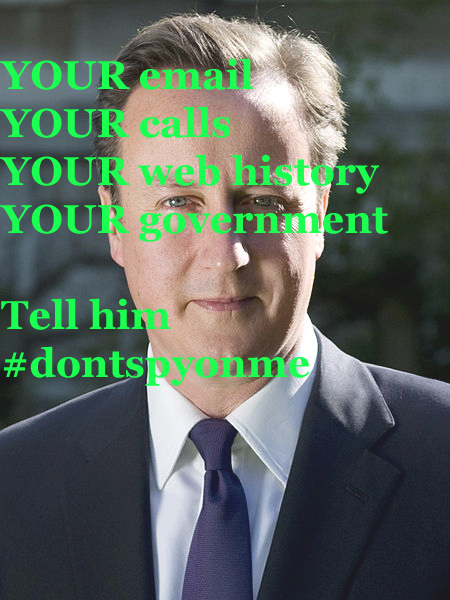
Index has launched a petition calling on European Heads of Government to stop the US, UK and other governments from carrying out mass surveillance. We want to use public pressure to ensure Europe’s leaders put on the record their opposition to mass surveillance. Add your voice
01 Aug 13 | In the News
#DONTSPYONME
Tell Europe’s leaders to stop mass surveillance #dontspyonme
Index on Censorship launches a petition calling on European Union Heads of Government to stop the US, UK and other governments from carrying out mass surveillance. We want to use public pressure to ensure Europe’s leaders put on the record their opposition to mass surveillance. They must place this issue firmly on the agenda for the next European Council Summit in October so action can be taken to stop this attack on the basic human right of free speech and privacy.
(Index on Censorship)
BAHRAIN
Prominent Bahrain blogger arrested: Activist
The massive street demonstrations that roiled Brazil last month have eased but more radical groups are coming to the fore and resorting to violence.
(Strat Risks)
BRAZIL
Brazil’s social unrest easing but turning more radical
A rights activist in Bahrain says authorities have arrested a prominent blogger just days after warning of harsher measures against anti-government protesters in the violence-wracked Gulf kingdom.
(Ahram Online)
CHINA
Singer’s Arrest in China Fires Free Speech Debate
Hours after a man with long-running grievances against officialdom set off a homemade explosive at Beijing’s airport, a singer-songwriter turned to the Internet to release her own sarcastic wish list of to-be-bombed targets.
(ABC News)
China dismisses allegations over obstruction of Google’s Gmail service
Chinese authorities say Google’s claims that they are to blame for technical problems with the Gmail are ‘unacceptable’
(The Guardian)
GERMANY
How Hollywood bowed to the wishes of Hitler
A Harvard film scholar has revealed in terrifying detail how Hollywood was at the whim of the Nazis throughout the 1930s – censoring films and dropping others in a sinister collaboration with Hitler.
(The Daily Mail)
GLOBAL
The Picket Fenced Internet: Why Free Communication Is Over…If It Ever Existed?
The most harrowing realization of Edward Snowden’s NSA leaks is that the World Wide Web is no longer free.
(Huffington Post)
PAKISTAN
‘The biggest form of blasphemy we commit is to force another to live in fear’
YouTube has been blocked in Pakistan since September 2012 for hosting the “blasphemous” Innocence of Muslims film. But now the country’s parliament has been asked to define what actually constitutes blasphemy. Here are some suggestions to get them going
(Index on Censorship)
RUSSIA
Videotaped Bullying Of Gay Russian Youths Highlights Growing Homophobia
Some show youths being forced to drink urine, or having it poured over their heads. Others show young men being taunted with phallic sex toys, threatened with axes, and forced to carry wooden crucifixes.
(Radio Free Europe)
Russia’s anti-internet piracy law faces backlash
It’s championed by some as a new weapon to defend content-makers, decried by others as a blunt tool that could extend censorship of the net.
(BBC)
SOUTH AFRICA
SA’s outdated censorship legislation
Cracks cobwebbing across the broken screen of his tablet PC seem a metaphor for the stormy greeting given film maker Jahmil XT Qubeka’s third feature, Of Good Report.
(Financial Mail)
UNITED KINGDOM
Free speech is a bitter Twitter privilege
For too long the trolls have hidden behind cowardly anonymity in a virtual world they believe to be free of consequence
(The Daily Mirror)
Cameron Looks to China to Supply Europe’s First Internet Censorship Wall in Britain
So David Cameron’s government has finally laid his cards on the table. Getting the press and the public to comply with the draconian Leveson Star Chamber’s clampdown on freedom of expression and information was a hard sell, to say the least.
(21st Century Wire)
Ex-Tory treasurer Peter Cruddas wins £180,000 libel award
Billionaire businessman also awarded interim costs of £500,000 against The Sunday Times
(The Independent)
Twitter Abuse Isn’t a Censorship or Freedom of Speech Issue, It’s a Human Issue
Imagine you’re queuing up for a coffee. You order, and pull out a £10 note with which to pay. “Wouldn’t it be great to have a woman on a banknote?” you might remark as you hand it to the barista. “F*ck you, you f***ing sl*t,” he snarls back. “I’m going to wait for you outside later and rape you.” What do you do? Cry? Run away? Look around for help? Let’s say you look around for help. You turn to the woman standing next to you.
(Huffington Post)
UNITED STATES
Keller lawsuit vs. gamer EA Sports, NCAA clears major hurdle
Free speech – at least in the world of video games – took a hit Wednesday in the ongoing battle regarding player likenesses.
(CBS Sports)
No, the IRS Did Not Target Progressives Like It Targeted Conservatives
NPR’s politics blog has published a chart — compiled from a House Ways and Means staff analysis — of the different levels of IRS targeting between conservative and progressive groups. Bottom line? Far more conservative groups faced IRS scrutiny, they faced more questions, and were approved at a much lower rate than progressives. The chart is based on the IRS’s now-discredited “BOLO” (be on the lookout) lists.
(American Center for Law and Justice)
Does chief have right to post profane gun videos?
Police Chief Mark Kessler of Gilberton, Schuylkill County, has come under fire after posting profanity-laced videos on YouTube. Some have argued it’s a free-speech issue. Others have said it’s outrageous behavior for a police chief who is also a school board member. Reporter Nicole Radzievich” talks with two people with opposing viewpoints.
(The Morning Call)
Your free speech right comes with a hefty price tag these days’
They used to say freedom of the press belongs to those who can afford to own one. Perhaps, we should now say the right to exercise your free speech rights before local government agencies belongs only to those who can afford to pay for sending out public notices.
(4th ST8)
ACLU says begging is ‘free speech’
Calling the statute an infringement on free speech, the American Civil Liberties Union wants a federal judge to block police in Arizona from enforcing a law making begging a crime.
(Maricopa Monitor)
Previous Free Expression in the News posts
July 31 | July 30 | July 29 | July 26 | July 25 | July 24 | July 23 | July 22 | July 19 | July 18 | July 17 | July 16 | July 15 | July 12 | July 11 | July 10
31 Jul 13 | News and features, Pakistan, Religion and Culture

Asianet-Pakistan / Shutterstock.com
This article was originally published at Dawn.com
Dear Parliamentarians,
I write to you in the hope of assisting you in a rather arduous task being assigned to you by the Pakistan Telecommunication Authority (PTA). If recent reports are to be believed, the Pakistan telecommunication authority has done the unthinkable; in a rare moment of clarity the PTA has requested the parliament to define ‘blasphemy’.
Yes, after the country’s governor was shot 27 times for seeking pardon for a blasphemy accused mother, his murderer garlanded by lawyers and defended by the ex-Chief Justice of the Lahore High Court, a 14-year-old young girl and her family driven out of the country, a 70-year-old mentally unstable woman sentenced to 14 years in jails, several hundred burnt houses and dozens of lynched dead bodies later, you’ve finally been approached to determine what exactly classifies as blasphemy.
If you ask me, it’s rather strange that none of the incidents – or call them random acts of insanity – I summarised were able to do what a B-grade filmmaker was able to achieve. But then again, priorities! We are a nation of strange people and reactions; we forgive the unforgivable and punish ourselves for the crimes of others.
Without wasting much time, I’d want to discuss the important issue at hand. Now that you’ve been given the responsibility of defining blasphemy for the nation, given how difficult it is to be specific, and government policies are by their nature vague, I’d say go with enlisting instances of blasphemy for clarity’s sake:
- One commits blasphemy each time they harm another in the name of religion.
- One commits blasphemy each time they incite hatred for another in the name of religion.
- One commits blasphemy each time they justify murder in the name of religion.
- One commits blasphemy each time they persecute another for their faith or lack of it.
- One commits blasphemy each time they infringe the right to freedom of expression, opinion or movement of another, in the name of religion.
For the biggest form of blasphemy that we all almost always commit is to force another to live in fear for believing, speaking, thinking and sometimes even existing, as we justify it in the name of our faith or stand silent as we bear witness.
No videos, sketches or hate speeches have hurt Islam more than the reckless army of blood thirsty goons justifying vandalism in the name of religion.
There doesn’t exist a form of disrespect bigger than justifying cold-blooded murder and hate in God’s name. To instill fear and lawlessness in the society and to justify that as an act of faith. End the insanity now, tell the nation that we aren’t all potential blasphemers waiting to be lynched as and when the opportunity arises.
Trust me; it might do a lot more than just unblocking YouTube.
Yours,
A fellow potential blasphemer
31 Jul 13 | In the News
#DONTSPYONME
Tell Europe’s leaders to stop mass surveillance #dontspyonme
Index on Censorship launches a petition calling on European Union Heads of Government to stop the US, UK and other governments from carrying out mass surveillance. We want to use public pressure to ensure Europe’s leaders put on the record their opposition to mass surveillance. They must place this issue firmly on the agenda for the next European Council Summit in October so action can be taken to stop this attack on the basic human right of free speech and privacy.
(Index on Censorship)
AFRICA
MISA express concern over rise in media freedom and freedom of expression violations across SADC
Having gathered in Lusaka, Zambia on Saturday, 27 July 2013, for its annual general meeting, the Media Institute of Southern Africa (MISA) made a statement.
(Lusaka Times)
CHINA
Tech Terms Censored Online in China
China’s surveillance of its citizens’ digital activities is common knowledge. However, questions remain concerning what content is targeted by government censors and how these blacklists change in response to current events.
(Mashable)
EGYPT
AFTE highlights the fine line between freedom of expression and incitement
The Association for Freedom of Thought and Expression (AFTE) released a report Tuesday distinguishing between what it called legitimate freedom of expression and hate speech tied to incitement of violence and racial discrimination.
(Daily News Egypt)
FRANCE
Censorship, Mediapart and the butler’s tapes
Following a court decision that became effective last Monday, independent French news website Mediapart has had to withdraw the infamous Bettencourt “butler tapes” from its website, as well as 72 articles including quotes from the recordings, prompting a campaign of solidarity in the French and international media.
(Index on Censorship)
GLOBAL
Extreme Internet censorship proposals challenged
As you may have heard, the latest round of secretive Trans-Pacific Partnership (TPP) talks have been taking place in Malaysia over the last two weeks. As with previous rounds, the Malaysia TPP talks took place in an atmosphere of near-total secrecy. Citizens, public interest groups, and internet users have been completely excluded from the negotiations, which are taking place between a small cabal of old industry lobbyists and unelected bureaucrats.
(Rabble)
MALAYSIA
Let people judge controversial movies
The decision by the Film Censorship Board to review the film ‘The New Village’ after having already given it the green light makes a mockery of our nation’s laws, policies and commitment to the right to freedom of expression.
(Free Malaysia Today)
RUSSIA
Russia to Ban Swearing Online: UK to Follow?
Yesterday I wrote about the slide into censorship and self-censorship that the UK government’s misbegotten plans to impose a default set of Net blocks could bring about. Of course, the UK is not alone in seeking to introduce disproportionate schemes.
(Computer World UK)
Russia should learn from Britain’s record on gay rights
Russia’s new ‘propaganda law’ is a more extreme version of the UK’s infamous section 28. It must be internationally condemned
(The Guardian)
SAUDI ARABIA
Saudi liberal blogger sentenced to 600 lashes and seven years in jail
A Saudi activist is being punished after calling for a “day of liberalism”
(Index on Censorship)
SLOVAKIA
Slovak lawyers demand apology for being depicted as pigs
The Slovak Bar Association has demanded an apology for a political cartoon depicting them as pigs, saying it is defamatory and dangerous.
(Index on Censorship)
TUNISIA
Release Femen Activist Held On Politically Motivated Charges
Today’s decision by a Tunisian court to dismiss a defamation case against the 18-year-old FEMEN activist Amina Sboui is only a partial victory, Amnesty International said as it called for her release.
(AllAfrica.com)
TURKEY
Intimidation and self-censorship rising in Turkey
Turkey currently holds 64 journalists in its prisons, according to the opposition. Since the begin of the Gezi Park protests, working as journalist critical of Premier Erdogan has become increasingly difficult.
(DW)
Turkey stands at the crossroads. Will it opt for democracy?
If the government changes its attitude to the protests, Turkey could become an exemplar state in the Muslim world
(The Guardian)
In Turkey, Critics of Erdogan’s Government Claim Familiar Pattern of Reprisal
The fallout from the June protests in Turkey is settling into a growing pattern of reprisal against those dissenting against Prime Minister Recep Tayyip Erdoğan, critics of his government say. But that pattern may be backfiring, as it is fueling further discontent among Erdoğan’s opponents, and bolstering their ranks with some of his former supporters.
(Time)
UNITED KINGDOM
We can make Twitter better, but never perfect
Online misogny is a complex problem with no single solution
(Index on Censorship)
When it comes to free speech, Twitter is caught between a rock and a very hard place
An incident in which a British journalist was subjected to hundreds of abusive tweets has highlighted Twitter’s ongoing struggle to balance its defence of free speech and the rights of its users with the need to curb abuse.
(GigaOM
When it comes to free speech, Twitter is caught between a rock and a very hard place
It’s a question of where to start: TalkTalk’s filter provided by Huawei; more than porn will be blocked; UK’s ‘pornification’ MP Claire Perry hacked and now sued; at least one ISP in open rebellion; and Anonymous launches op PornStorm.
(Info Security)
Don’t lose your head over Hirst
Academics in Leicester object to a photo of Damien Hirst posing with a severed head being put on show – but why? It’s a work of genuine artistic integrity
(The Guardian)
UNITED STATES
Index on Censorship condemns verdicts in Bradley Manning case
Free speech organisation Index on Censorship condemns the guilty verdicts in the trial of Bradley Manning. However, we welcome the verdict of not guilty to the charge of aiding the enemy.
(Index on Censorship)
Bradley Manning: A verdict that shows a sense of perspective
In finding the the WikiLeaks whistleblower Bradley Manning guilty of espionage but not of aiding the enemy, a US military court delivered a verdict which showed a welcome sense of perspective after one of the most convulsive episodes in recent American judicial history.
(The Independent)
NYPD attempts to censor anticipated Park Avenue art project
An artist’s protests over his New York art installation raises the question of how to play nice in public spaces
(The Guardian)
Previous Free Expression in the News posts
July 30 | July 29 | July 26 | July 25 | July 24 | July 23 | July 22 | July 19 | July 18 | July 17 | July 16 | July 15 | July 12 | July 11 | July 10
30 Jul 13 | About Index, Campaigns, Press Releases
Free speech organisation Index on Censorship condemns the guilty verdicts in the trial of Bradley Manning. However, we welcome the verdict of not guilty to the charge of aiding the enemy.
Index Editor, Online and News, Sean Gallagher said:
‘Manning is a whistleblower who leaked files in order to inform the world about what really happened during the Iraq War to no personal gain. Index condemns this verdict and calls on the US government to abide by its duty to protect whistleblowers who speak out in the public interest. We urge the court to show leniency when sentencing Manning tomorrow.’
For more information and interviews, please contact Pam Cowburn, [email protected], 07749785932
30 Jul 13 | Religion and Culture, Saudi Arabia
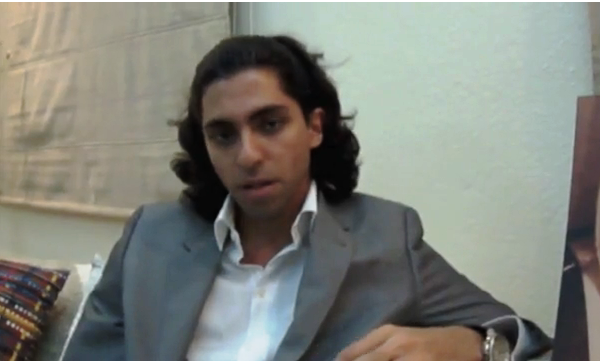 Raif Badawi, founder of the Free Saudi Liberals site, has been sentenced to seven years in jail and 600 lashes by a Jeddah court, according to a tweet from his lawyer Waleed Abu Alkhair yesterday
Raif Badawi, founder of the Free Saudi Liberals site, has been sentenced to seven years in jail and 600 lashes by a Jeddah court, according to a tweet from his lawyer Waleed Abu Alkhair yesterday
Badawi’s wife Ensaf Haidar, who now lives in Lebanon, confirmed the sentence to CNN’s Mohammed Jamjoom.
Badawi was arrested in June 2012 for “insulting Islam through electronic channels”. Abualkhair said the conviction was connected to charges of “insulting the religious police” and ridiculing religious figures in the kingdom.
In January, a court had refused to hear apostasy charges against Badawi, concluding that there was no case. Apostasy carries the death sentence in Saudi Arabia.
Among evidence against Badawi was an allegation that he had “liked” an Arab Christian page on Facebook. His lawyer believes he was pursued after calling for a “day of liberalism” in May 2012.
The court has also ordered that Badawi’s website be shut down.
30 Jul 13 | Europe and Central Asia, Politics and Society, Slovakia
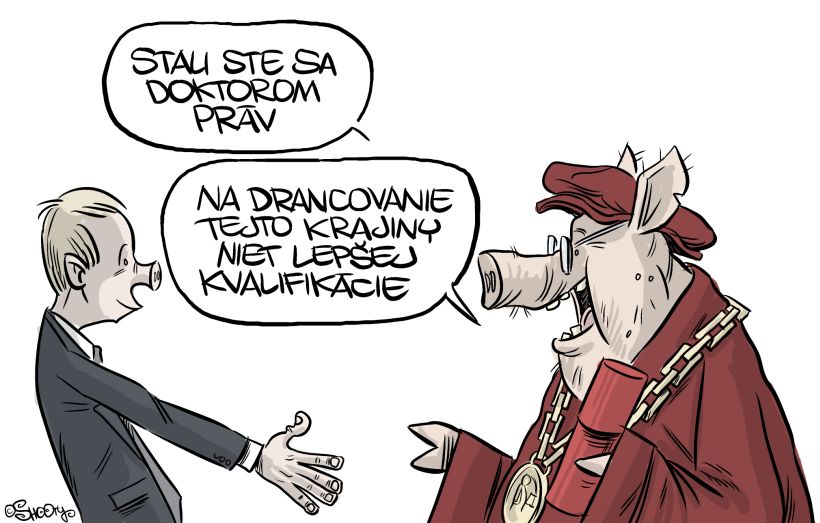 The Slovak Bar Association has demanded an apology for a political cartoon depicting them as pigs, saying it is defamatory and dangerous.
The Slovak Bar Association has demanded an apology for a political cartoon depicting them as pigs, saying it is defamatory and dangerous.
The cartoon shows a newly qualified lawyer receiving his diploma from another lawyer, both depicted as pigs, with the message “You’ve become a doctor of law. There is no better profession for looting/plundering of this country.”
“The Chamber does not want to interfere with the right to freely express your opinions in public and even in the form of cartoons, however, that freedom of expression must not unreasonably interfere with the rights of others or belittle them,” the Slovak Bar Association said in a statement.
They argue that the cartoon is dangerous speech, which defames a group of people based on their education.
The cartoon was by Slovakia’s most popular political cartoonist Shooty, whose real name is Martin Sutovec. It was published in Sme, one of the country’s biggest daily newspapers.
While freedom of the press is guaranteed by the constitution, this is not the first time the media freedom has come under threat.
In 2010, Shooty won a lawsuit filed against him by then Prime Minister Robert Fico, over a cartoon of a doctor telling him his back pain was non-existent as he was spineless.
In March this year, a verdict ordering Sme to publish three apologies or be fined €150,000 was upheld. This stemmed from an article about a member Slovakia’s Council of Judges, who was given a free hunting trip, which would constitute an illegal gift.
30 Jul 13 | Digital Freedom, News and features, United Kingdom
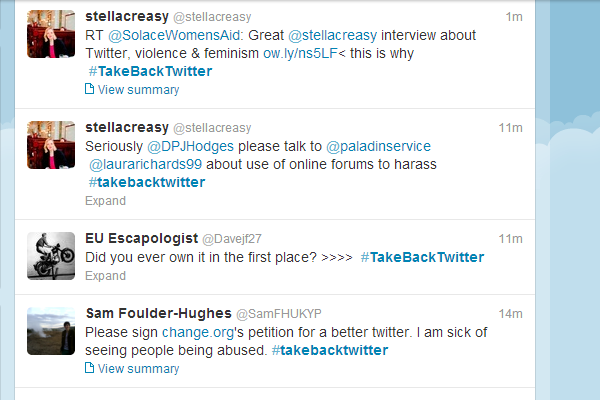 On a BBC Newsnight discussion last night, panelists were asked if they felt that a watershed moment had been reached in our attitude to misogynist abuse and threats on Twitter.
On a BBC Newsnight discussion last night, panelists were asked if they felt that a watershed moment had been reached in our attitude to misogynist abuse and threats on Twitter.
It certainly feels like a moment: The increasing pervasiveness of social media in UK public life, combined with a resurgent young feminist movement (aided by social media), has led to this tumult of voices. We all seem to agree that something should be done about threats of rape, such as the ones experienced by Labour MP Stella Creasey, but the question is what?
Twitter yesterday released a statement saying they would look into introducing a report abuse button under all tweets. This, the company pointed out, is in fact already available on the Twitter iphone app, and will soon be rolled out on Android and desktop.
But some see a danger in this: a report button, they suggest, could easily be abused. Celebrity users with a large amount of followers could, for example, get their fans to report critics.
Political opponents and human and civil rights activists could easily be marked as abusive by users. I can imagine, for example, that Index on Censorship’s account would repeatedly be reported as abusive by, say, highly co-ordinated pro-Bahraini government tweeters.
What are the alternatives? Writing for the Guardian, Index contributor Jane Fae says that the focus is too much on the potential solutions Twitter can provide and not enough on the existing laws in place. Earlier this year, the Crown Prosecution Service released guidelines on social media user prosecutions. Index greeted these as by and large sensible (interesting to note that these came about because of a feeling that there were too many prosecutions of social media users; though there is a distinction between generally offensive material and specific, direct, threats).
Jane suggests a mechanism for reporting threats to the police, rather than Twitter:
“By all means, let’s have a button – but one that delivers reports of online abuse directly to the local police force, a bit like a security alarm, and not just to Twitter.
This relatively simple solution doesn’t exist yet but I’m currently coding a mock-up of one for Everyday Victim Blaming (EVB), a not-for-profit organisation set up to help stop violence against women. Installed on your computer, the button would let you generate instant email reports, detailing online abuse and asking the police to investigate. It should also copy a report back to EVB or another campaign group. If the police really are swamped, that, in itself, is a thing – and may finally prompt politicians to ditch the soundbite and think a bit deeper on this issue.
Matt Flaherty, the prolific and interesting tweeter and blogger on free speech issues, brings the issue back to Twitter with his idea of a “panic mode” to help tweeters beleaguered by coordinated attacks:
“My solution to this problem would be for Twitter to introduce something like a panic button that would immediately but temporarily place one’s account into a state where all mentions are blocked except for those coming from the followers and following lists. Twitter could also allow the user to open a case and have mentions logged against that case to help Twitter to take action against those who violate the terms. Twitter could also perhaps warn users attempting to put the panicked account into a mention or reply. Perhaps they could ask for confirmation either within the stream or in an email. An alternative would be to actually disallow the creation of the mention or reply. A blocked account is currently not allowed to perform a reply but it can use a mention. The same rules might apply here. The mention would still not be seen.”
It’s an interesting idea, particularly for the kind of abuse Caroline Criado-Perez was subjected to: The campaigner was receiving 50 tweets an hour, suggesting a level of co-ordination. Flaherty’s proposal is a kind of advanced version of Don’t-Feed-The-Trolls, allowing a user to silence the angry mob directed at them.
The Daily Telegraph’s Marta Cooper (formerly of this parish), points out, however, that technological fixes are not the answer to societal problems:
“The offline world is still inhabited by some men who believe that women who voice an opinion must be put in their place. This is simply reflected and amplified online. Twitter did not create the misogynistic monsters that hurled grotesque tweets at Criado-Perez or send the same to other women on a regular basis; online platforms simply make it easier for these individuals to behave in appalling ways, and it is far harder to ignore published text than a hateful comment made by some Neanderthal in a pub.
“As with other societal problems, there is no quick fix – technological or otherwise – to something which has centuries’ worth of roots. It is far more valuable and worthwhile to expose hate for what it is and to debate why it occurs in the first place.”
Martin Belam makes a similar point here.
So what do we do? MPs have called Twitter executives to testify at the House of Commons: there is no doubt Twitter could have handled this better – the action of their New York based manager of journalism Mark S Luckie, blocking critical but polite UK voices, has been particularly unfortunate. No doubt the Twitter representatives will face demands from MPs to do something, and fast.
But we should be careful of quick fix solutions: the police are investigating the threats against Criado-Perez and Creasy; it is likely there will be prosecutions. This may seem frustratingly slow for some, but that is the pace of these things. The instant nature of social media means we often expect instant remedies for problems that are, as Ben Goldacre puts it, a little bit more complicated than that. Collective effort and thought on this should take precedent over the kind of kneejerk thinking about the web that too often dominates (see David Cameron’s “ban all the bad things” speech last week). We want the web to be free and diverse, but we also want the web to be, as much as possible, a positive experience for people. This is the challenge we face, and our reactions over the issues raised in the past few weeks could have consequences for years to come. Together we can make the web better, but we should be wary of attempts to make it perfect.
30 Jul 13 | About Index, Campaigns, Press Releases
Stephen Fry, Bianca Jagger and Anish Kapoor sign Index on Censorship petition to end mass surveillance by the NSA, GCHQ and other governments.
Celebrities, artists, activists and politicians have signed an Index on Censorship petition calling for Europe’s leaders to oppose mass surveillance by the US, UK and other governments, as revealed by whistleblower Edward Snowden. Supporters of the petition include writer and actor Stephen Fry, activists Bianca Jagger and Peter Tatchell, writer AL Kennedy, artist Anish Kapoor, blogger Cory Doctorow and Icelandic politician Kolbrún Halldórsdóttir. 15 international NGOs are also backing the petition.
Actor Stephen Fry said:
‘Privacy and freedom from state intrusion is important for everyone. You can’t just scream “terrorism” and use it as an excuse for Orwellian snooping.’
Director of Campaigns and Policy, Marek Marczynski said:
‘Since the revelations about the activities of the NSA and GCHQ, Europe’s Heads of State have been slow to take action over the mass surveillance of European and other citizens. Although some have voiced concerns, there has been no commitment to taking joint action. People from around the world are signing Index’s petition because they want Europe’s leaders to say no to mass surveillance, and condemn it as both an invasion of privacy and a threat to free speech.’
As well as calling for Europe’s leaders to state on the record their opposition to mass surveillance, the petition demands that mass surveillance is on the agenda at the next European Council Summit in October.
The petition is at: http://chn.ge/1c2L7Ty and is being promoted on social media with the hashtag #dontspyonme
It is supported by Index on Censorship, English PEN, Article 19, Privacy International, Open Rights Group and Liberty, European Federation of Journalists, International Federation of Journalists, PEN International, PEN Canada, PEN Portugal, Electronic Frontier Foundation, PEN Emergency Fund, Canadian Journalists for Free Expression (CJFE), the National Union of Somali Journalists and the Bahrain Center for Human Rights.
For interviews or more information, please contact [email protected]. +44 (0) 207 260 2662.
30 Jul 13 | France, News and features, Politics and Society

In a controversial ruling, a French court has ordered Mediapart to withdraw Bettencourt “butler tapes” from its website.
Since Tuesday 3 November 2015, the fourth part of the Bettencourt case is being judged in a Bordeaux court. This time the accused is Pascal Bonnefoy, former butler of Liliane Bettencourt. Bonnefoy is accused of privacy violations in conjunction with media outlets Le Point and Mediapart, which reproduced excerpts of recordings Bonnefoy had made. The tapes allowed the French justice system to condemn several people for abuse of a vulnerable person — the L’Oréal heiress — and spawned investigations into alleged corruption.
Following a court decision that became effective on Monday 22 July 2013, independent French news website Mediapart has had to withdraw the infamous Bettencourt “butler tapes” from its website, as well as 72 articles including quotes from the recordings, prompting a campaign of solidarity in the French and international media.
In the balance between freedom to inform and right to privacy, the court ruled that it was more important to protect the right to privacy. Reporters Without Borders published the censored content on Wefightcensorship.org, a website that has until now published content from countries more commonly associated with abuses of press freedom, such as Turkmenistan, China and Belarus.
Between 2009 and 2010, Pascal Bonnefoy, the butler of L’Oréal heiress, 87 year-old Liliane Bettencourt, secretly recorded conversations between his boss and Patrice de Maistre, her wealth manager, as well as other advisers. As Bonnefoy explained in a recent interview with French Vanity Fair, he did this because he thought Bettencourt was being manipulated by a close circle of advisers and friends. Apalled by the conversations he had intercepted, he gave the recordings to Bettencourt’s daughter who gave them to representatives of the justice system.
A 21 hour-long copy of the tape also came in possession of Mediapart and Le Point magazine. Journalists at the two publications edited down the content to one hour, getting rid of references to Liliane Bettencourt’s private life. What they kept was damning: the excerpts published in June 2010, contained, among other things, evidence of tax evasion and influence peddling, they raised suspicions of illegal political funding and interference in justice proceedings by a French presidential adviser.
The butler tapes have been at the centre of a lengthy investigation, as the Bettencourt case gradually unfolded, turning into the Bettencourt-Woerth case (when it appeared that Eric Woerth, successively budget and labour minister during Sarkozy’s presidential term, was involved) and the Sarkozy case, when France’s ex-president was placed under investigation over allegations that he had accepted illegal donations. The recordings were recognised as evidence by the criminal chamber of the appeal court in January 2012 and will be at the centre of a trial in Bordeaux, which date is still to be announced.
Meanwhile, following a complaint by Bettencourt’s legal guardian and by her former wealth manager, the Versailles appeal court ruled on 4 July that Mediapart and Le Point had to take down the recordings and all direct quotes from it or face significant financial penalties (10,000 euros per day per infraction). They will also have to pay 20,000 euros of damages to Bettencourt if her representatives claim the fee.
“What’s the balance between the freedom to inform and the right to privacy? This is the question raised by this ruling”, says Antoine Héry, head of the World Press Freedom Index at Reporters Without Borders. For him, the excerpts of the recordings used by Mediapart and Le Point are of public interest. “Erasing this content means erasing a part of this country’s collective memory”, he says. “Mediapart has written a lot about the case, which marks an important moment of French Fifth Republic’s history, and possibly one of the greatest scandal it has known,” he adds. The ruling might have a chilling effect – and make it more difficult for journalists to break stories in the future, for fear of costly court proceedings and fees. It will also make it complicated for Mediapart to write about the upcoming Bordeaux court case, as its journalists won’t be able to quote from the recordings, which constitute a very central piece of evidence.
“This decision”, says Edwy Plenel, a former Le Monde editor, who co-founded Mediapart in 2008 with other former print journalists, “is incredibly backwards, and recalls the very reactionary decisions taken by the judiciary system during the Second Empire, which showed an increasing tension towards the growing modernity of the publishing world and journalism.” For Plenel, the verdict can only be read as a reaction to changes prompted by the Internet – which allows a free circulation of information. It is part of a greater debate which has been taking place around the Snowden and Wikileaks case, and the Condamin-Gerbier case in Switzerland, where national security, banking secrecy and protection of privacy are opposed to the right to inform. Mediapart will appeal to the decision in France and take the case to the European Court of Human Rights if needs be.
The solidarity campaign which immediately followed the Versailles court decision has shown that such a verdict was absurd in the era of internet. After three years, the Bettencourt file has entered the public domain and has been copied everywhere: it’s easy to find on BitTorrent or Reflets.info. Following the verdict, several publications immediately offered to host the content that Mediapart was obliged to censor as a sign of protest. Among them, Belgian national newspaper Le Soir, French publications such as rue89 website, Les Inrockuptibles magazine or Arrêt sur Images website. Media organisations, NGOs and unions launched an appeal entitled “We have the right to know” supported by 53,000 signatures, which said: “When it comes to public affairs, openness should be the rule and secrecy the exception.”
Following the Streisand effect, the Versailles verdict seems to have backfired. Never have so many people listened to the Bettencourt tapes, nor read about the story, nor be interested in Mediapart, an investigative journalism website which has proven its ability to set the news agenda in France, and created a new business model as French printed press sunk deeper into crisis – Mediapart charges readers for access and doesn’t carry any advertisement.
Le Monde, France’s most well-known newspaper, abstained from the solidarity campaign, as well as conservative newspaper Le Figaro, a decision seen by many as disappointing, given that Le Monde was associated with Wikileaks and Offshore Leaks earlier this year.
“For me”, says Plenel, “this can be explained by a certain illiberal tradition within the French press, the fact that in this country journalism is often too close to political power, and also by a certain fear of the changes that Internet is causing in the media – embodied by Mediapart.” This distrust of new media associated with the Internet could explain the smear campaign endured by Mediapart by a good part of the traditional and conservative press from December last year, when the website broke the Cahuzac scandal (also prompted by a tape) which caused France’s budget minister to resign in April, finally admitting that he had a secret offshore account. France’s traditional written press seems to have become extremely cautious, and unable to break scandals, a task which was filled for a long time by the satirical weekly publication Le Canard Enchaîné, and now is also filled by Mediapart.
How does France rank on the Press Freedom Index?
“It’s only 37”, says Héry. A mediocre rank explained by the mediocrity of the law framing the protection of sources for journalists, and by reforms passed during Sarkozy’ presidency which streightened governmental control over France Télévisions, the French public national television broadcaster – allowing France’s president to name its CEO. Hollande’s government is expected to work on these issues – and new laws on the protection of sources for journalists, the status of whistleblower, and the nomination of the head of France Television should be passed. On Friday, the appeal launched in solidarity with Mediapart was handed to Aurélie Fillippetti, minister of culture and communication of the Hollande government, as well as the whole Bettencourt file.
Interestingly, the Versailles verdict took place on the same day France refused to grant asylum to Edward Snowden – a strong reminder that France could do a lot better to protect the right to inform and to be informed.






 Raif Badawi, founder of the Free Saudi Liberals site, has been sentenced to seven years in jail and 600 lashes by a Jeddah court, according to a tweet from his lawyer Waleed Abu Alkhair yesterday
Raif Badawi, founder of the Free Saudi Liberals site, has been sentenced to seven years in jail and 600 lashes by a Jeddah court, according to a tweet from his lawyer Waleed Abu Alkhair yesterday The Slovak Bar Association has demanded an apology for a
The Slovak Bar Association has demanded an apology for a  On a BBC Newsnight discussion last night, panelists were asked if they felt that a watershed moment had been reached in our attitude to misogynist abuse and threats on Twitter.
On a BBC Newsnight discussion last night, panelists were asked if they felt that a watershed moment had been reached in our attitude to misogynist abuse and threats on Twitter.